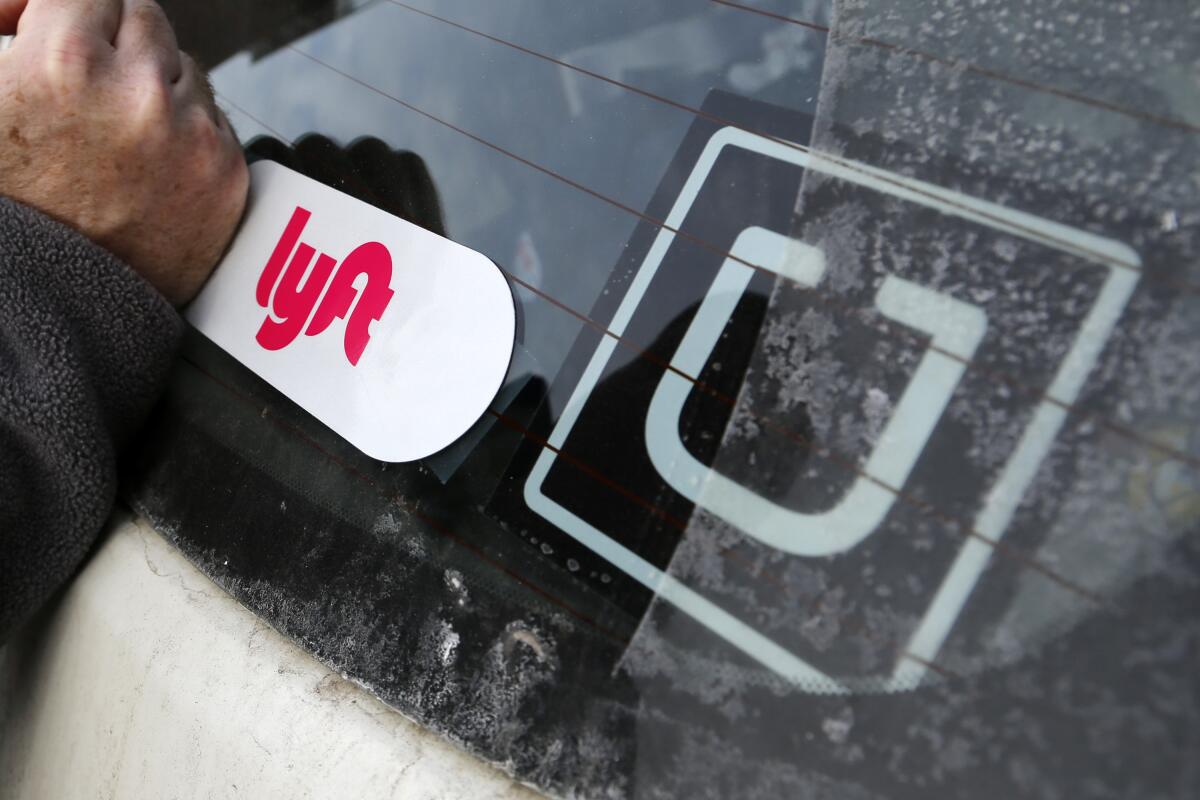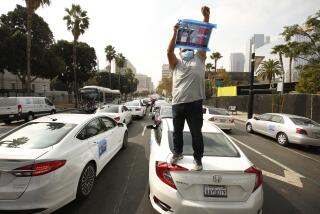Uber and Lyft granted emergency stay, will not shut down in California tonight

Uber Technologies Inc. and Lyft Inc. were spared from having to rapidly convert their California drivers to employees after a state appeals court agreed they can keep their business models in place while challenging a judge’s order to comply with a state labor law.
The decision Thursday is a big but temporary reprieve for the ride-hailing companies, whose leaders threatened to shut down in their home state indefinitely, saying they would not be able to shift to providing drivers with costly benefits including health insurance and overtime on short notice.
The court has ordered Uber and Lyft to submit sworn statements by their chief executives by early September certifying that they have a plan to hire drivers as employees, in the event the court does not decide in their favor. Both companies now have five days to agree to the procedure laid out by the court. The appeals court scheduled arguments for Oct. 13.
Shares in both companies rose on the news. Lyft ended the day up 5.8% and Uber finished up 6.8%.
“We are glad that the court of appeals recognized the important questions raised in this case, and that access to these critical services won’t be cut off while we continue to advocate for drivers’ ability to work with the freedom they want,” Uber said in a statement.
Lyft also indicated that it would not shut down services this week and pointed to a November ballot measure backed by gig economy companies that would exempt them from a sweeping new California labor law.
“While we won’t have to suspend operations tonight, we do need to continue fighting for independence plus benefits for drivers. That’s the solution on the ballot in November, and it’s the solution drivers want because it preserves their ability to earn and to use the platform as they do now — whenever they want — while also getting historic new benefits. Without it, 80-90% of Californians who earn on app-based platforms will lose that opportunity,” Lyft spokeswoman Julie Wood said in a statement.
The delay buys time for the companies as they campaign for Proposition 22, which would exclude app-based transportation and delivery companies from Assembly Bill 5, which set stricter standards for classifying workers as contractors. Uber, Lyft, and several other gig economy companies have refused to comply with the law since it went into effect Jan. 1.
Proposition 22 carves out a new category of work, sparing the companies from paying for full benefits that employees currently get under California law, such as unemployment insurance and complete workers’ compensation, while requiring them to pay 120% of minimum wage, healthcare contributions and medical and disability coverage, among others.
In May, state Atty. Gen. Xavier Becerra brought a lawsuit against Uber and Lyft alleging that by misclassifying drivers as independent contractors, the companies deprived them of worker protections and benefits such as a minimum wage and unemployment insurance.
Agreeing with Becerra’s argument, San Francisco Superior Court Judge Ethan Schulman ordered ride-hailing companies to classify their drivers as employees rather than independent contractors earlier this month.
Both companies filed appeals, but Schulman refused on Aug. 13 to stay the injunction, setting the stage for Thursday’s emergency stay. Schulman noted that gig companies have had two years to prepare for this, since a 2018 California Supreme Court decision called Dynamex made it harder for companies to classify workers as independent contractors. AB 5 codifies the Dynamex decision.
“We’re confident in the facts of our case and we look forward to continuing our fight to defend the rights of workers across the state,” Becerra’s office said in a statement.
While the court of appeal gave Uber and Lyft a bit of reprieve, the conditions it set in the order don’t give the companies much wiggle room. The court seems frustrated that Uber and Lyft are acting as if they just heard of the state law that went into effect nearly nine months ago, said Charlotte Garden, a labor law professor at Seattle University School of Law.
“My best effort at mind reading is the court was dismayed by the fact that Uber and Lyft seemed to be saying they had no plan in place to comply with AB 5, and were just going to shut down for the immediate future,” Garden said.
The court appears to be ordering the companies to certify that they have crafted plans to comply with AB 5, not submit their specific proposals, Garden said. That gives the companies some wiggle room; but it might be best, she advised, for them to release their new policies.
“It’s like when President Nixon said he had a secret plan to end the war,” she said. “That didn’t go over tremendously well. People were like, ‘We want to know what the plan is.’”
Labor groups including Mobile Workers Alliance and Gig Workers Rising opposed Uber’s and Lyft’s plans to halt California operations, and organized a protest Thursday morning before the shutdown was called off. Uber and Lyft drivers lined up their cars along Will Rogers Street by Los Angeles International Airport with posters deriding Proposition 22.
José Noriega, a driver who attended the protest, was worried this morning about how he would make money if the services shut down in the state.
“We have to do something about it,” he said. “We want more protections and benefits. Two weeks ago, I had to spend more than $1,000 to fix my car. They don’t care about that.”
When news was handed down about the emergency stay, drivers relaxed, grateful that they wouldn’t immediately lose ride-hailing as a source of income.
“I’m relieved drivers will be able to continue driving. But this is a reminder of what [Uber and Lyft] are willing to do to win, and their lack of empathy and greed,” said Jerome Gage, a Los Angeles-based driver who attended the protest.
Bloomberg contributed to this report.







